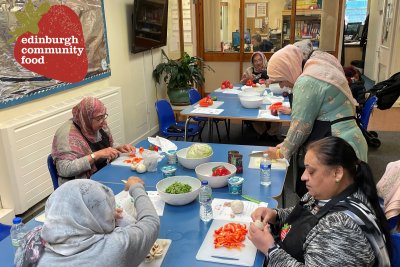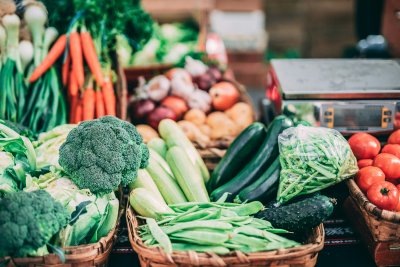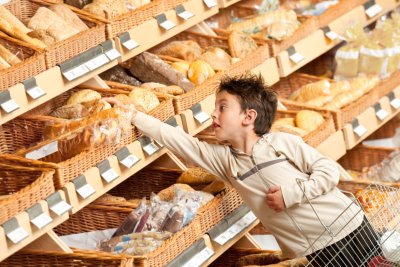Blogs • Good Food Trade Campaign
Government says it has no duty to secure food supplies in a no-deal Brexit (nor any other crisis)
Two official documents this week reveal that our Government feels no legal responsibility for securing our food supplies in an emergency – neither fire, flood, disease epidemic, conflict, supply chain disruption, nor no-deal Brexit.
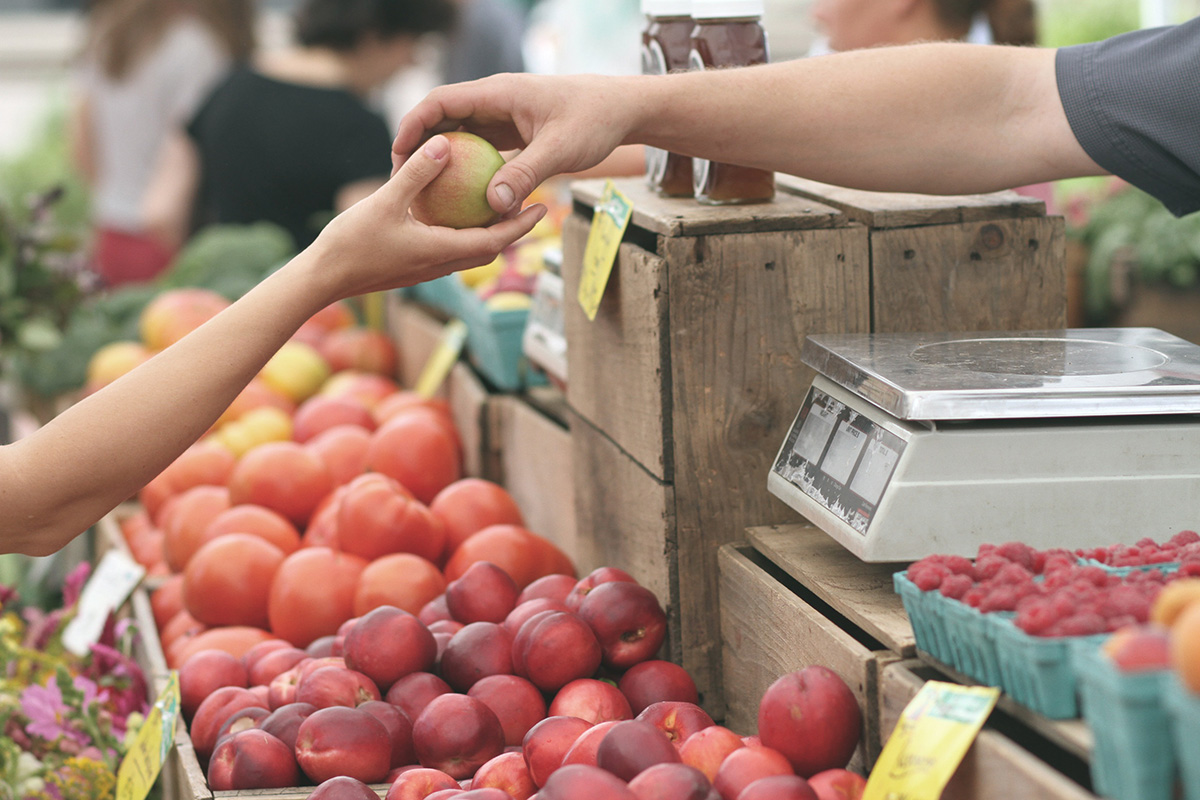
This article was published in 2019, but remains deeply relevant to concerns about food supplies and food access in 2020, in relation to the Covid-19 food crisis experienced by millions of people in the UK; and also the possibility of a no-deal Brexit, which remains a disastrous prospect for British food and farming.
In one of the documents (Defra’s answer to a Parliamentary Question), the Government places the main responsibility for securing our food supply in an emergency squarely with the commercial food industry. Yet the other document (Yellowhammer) clearly acknowledges that “Private sector companies’ behaviour will be governed by commercial considerations, unless influenced otherwise.” In a food crisis, we are caught between a rock and a very hard place.
We must all sit up and take serious notice, because this lack of legal responsibility and buck-passing affects everyone that might get caught up in no-deal Brexit chaos, or indeed any future emergency; but it affects vulnerable pensioners, children and people who are sick or destitute most of all.
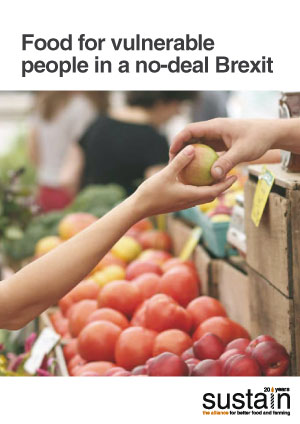 Read Sustain’s 2019 briefing on Food for Vulnerable People in a No-Deal Brexit, containing data on the scale of need and an update on progress by government (or lack of it) with making available a hardship fund to ensure that everyone gets the food they need in a no-deal food crisis.
Read Sustain’s 2019 briefing on Food for Vulnerable People in a No-Deal Brexit, containing data on the scale of need and an update on progress by government (or lack of it) with making available a hardship fund to ensure that everyone gets the food they need in a no-deal food crisis.
Sustain has undertaken intensive work over the past nine months, supporting leading food aid organisations feeding people in extreme need, and groups working on school, care-home and hospital food, attempting to get their concerns addressed by Government Ministers. These organisations are deeply worried about the consequences of a significant rise in food prices and significant disruption to fresh food supplies. These distinct possibilities are identified in the Government’s Operation Yellowhammer document published on 11 September, setting out ‘reasonable worst-case planning assumptions’ for a no-deal Brexit. Assumptions include:
- The possibility of significant delays, disruption and shortages in fresh food supplies over a period of at least three months – possibly more – and significant food price rises.
- HM Treasury stating that: “Low-income groups will be disproportionately affected by any price rises in food and fuel”.
As well as fresh food shortages, disruption and food price rises, the groups Sustain works with are also concerned about the likelihood of those price rises and disruption causing food donations to dry up, for the frontline charities that serve extremely vulnerable people – an issue not even touched upon in the Yellowhammer document.
This year, we have met with officials from Defra, the Department for Work and Pensions, HM Treasury, the Ministry of Housing, Communities and Local Government (MHCLG); written to the Prime Minister and numerous Secretaries of State and Ministers; sent our concerns to the 40+ Local Resilience Forums (LRFs, generally run by the emergency services and working with local authorities, which organise crisis responses in local areas); presented to nine regional Council chief executives; and orchestrated statements of concern in select committees, parliamentary questions, Westminster Hall Debates and numerous media stories and letters to the press. Yet despite these strenuous efforts and many conscientious interventions by admirable individual civil servants and local government officials, LRF representatives, food industry leaders, MPs and civil-society groups (many helping confidentially despite being bound to the Government’s Brexit Non Disclosure Agreements; motivated by compassion for those who could experience hardship), most of our questions and concerns remain wholly unanswered.
Indeed, our concerns have only deepened. The Operation Yellowhammer document acknowledges that “Low income group will be disproportionately affected by any prices rises in food and fuel”. At the same time, the Department for Food, Environment and Rural Affairs (Defra) provided a dismaying response to a parliamentary question on legal duties with regards securing food supply in an emergency. Defra’s official statement says (with direct quotes indicated and full text available here):
- “Defra is not responsible for the supply of food and drink to the population in an emergency.”
- “Local authorities do not have a general duty to provide food but have duties to provide food to particular groups in particular circumstances, including schools and care settings.”
- “The expertise, capability and levers to plan for and respond to food supply disruption lie within the industry,” and “The food industry is experienced in dealing with scenarios that can affect food supply.”
- Food for schools (Department for Education), hospitals and care settings (Department of Health and Social Care) and prisons (Ministry of Justice) “is led” by different government departments and Defra provides “advice and support”.
- And there is a welfare benefits safety net.
Pause a moment to take on board the implications of this official government position, in light of the Yellowhammer contingency planning document released this week, highlighting the ‘reasonable worst-case scenario’ of a no-deal Brexit, including shortages of fresh food over a period of three months or more, and the likelihood of a significant rise in food prices. Here are the worrying conclusions that we draw from the collision of these two official documents and our experience over the past year:
- In a food emergency, our Government does not feel a duty to:
- step in and secure food supplies, neither for the general population, nor for people most vulnerable to food price rises and shortages of fresh food.
- assess the scale of need, nor to publish data openly to help with resilience planning and resource allocation.
- allocate adequate resources to address the crisis.
- Our Government expects the commercial food industry to be willing and able to ensure that everyone gets the food they need, including those with too little money and those who have difficulty accessing the shops.
- If you receive meals in a care home, hospital, prison or school, your food supply might be secure, but this is not guaranteed; and for children, the school holidays are not covered (except potentially in those areas where there is a scheme to address holiday hunger).
- Welfare benefits already fall short of providing for household food security, are not calculated to meet the cost of living (including not taking into account food price rises), and would be unlikely to rise to meet the higher food prices likely in a national food crisis.
- Other European countries are reportedly considering declaring no-deal Brexit a ‘natural disaster’ in order to trigger emergency funds to help out businesses and vulnerable people. No such luck in the UK. Despite some passing references over the past nine months to our Government having considered making available a hardship fund to address vulnerability, there is no indication that any money has been allocated beyond ‘business as usual’ welfare benefits, nor in any case have suitable methods of disbursement been agreed that would reliably reach those most in need.
When I talk about these issues, I sometimes get the response, “Well, we managed in Wartime,” usually with an appeal to unity and British values. Our country did, of course manage to get through the War – I was brought up on the stories and lasting habit of not wasting a scrap of food. There was a lot of belt-tightening, a sense of solidarity and shared purpose, a common enemy and a national programme of rationing that was fair, universal and designed explicitlly to meet basic nutritional needs. We're good at fixing things when we all pull together. However, when faced with this argument, I am inclined to say that austerity has already tightened too many people’s belts further than they should be reasonably expected to go, to the point of persistent hunger. Our sense of shared purpose and solidarity is not in good health. And our national commitment to fairness and universal access to basics such as adequate and nutritious food are barely evident. We can and must do so much better than this.
Let us put our heads and hearts into ensuring that we can find a way to navigate the next few months without crashing out of the European Union with no deal.
When the immediate dust has settled, then the new National Food Strategy could provide a good space to discuss lessons learned from this nightmarish no-deal Brexit mess – a sort of ‘food truth and reconciliation commission’ in these divided times. We need to release our human compassion from non-disclosure agreements and revitalise our sense that access to decent food is a basic human right and a sign of a decent society.
But let’s get serious about ensuring that this situation cannot happen again. To de-politicise and systematise the ability for everyone to get the food they need, we need to ensure that we allocate legal responsibilities for ensuring that everyone has a right to food, which in turn can trigger the resources and accountability to enable this. Updating the Civil Contingencies Act and resilience planning guidance could be a useful start. However, this week’s two official documents have also served to bring into sharp focus Sustain’s commitment to champion everyone’s Right to Food to be properly integrated into UK law. The Scottish Government is on the verge of doing so as part of the Good Food Nation Bill. Whilst talking about healing the great divides in our society, Westminster-focused political parties have so far failed to pick up this momentum. Adopting the Right to Food into law would be a British value worth uniting behind.
Tell your MP you want them to save your food standards
The Agriculture Bill will be back in the House of Commons in October so we need you to take action NOW to protect food standards and ensure the Bill will help farmers to tackle the climate emergency.
Published Thursday 12 September 2019
Good Food Trade Campaign: Campaigning for good trade that benefits people and the planet at home and overseas.



